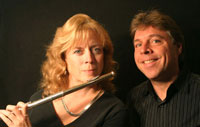 Robert Estrin
Robert Estrin
Robert Estrin is a pianist who truly lives his instrument. Not only does he play and teach with proficiency and passion, but he also knows just about everything there is to know about pianos - from their construction to their history. Music is "all in the family" for Robert, with his father, Morton, a concert pianist; his sister, Coren, a pianist as well; his wife, Florence, an accomplished flutist; and his daughter, Jennifer, a violinist of great acclaim.
Robert studied piano and French horn at New York City's Manhattan School of Music, and he also received a degree in piano performance from Indiana University. He performs with symphony orchestras, at arts festivals, for music teachers' associations, at museums, and on college campuses. His most unique performance experience, however, is his Living Piano: Journey Through Time. In this creative endeavor, Robert dresses in period costumes and plays historic instruments, from his own collection, to tell the story of the piano over time to a wide variety of audiences - not just piano enthusiasts.
Robert maintains a vibrant online presence, with countless videos on YouTube and through Virtual Sheet Music. His videos, which have been viewed by millions, are engaging, entertaining, informative, and sure to enhance the knowledge, skills, and overall playing experience of pianists from beginners to the most advanced.
Florence Estrin
Florence Estrin and her "Family of Flutes" - bass, alto, piccolo, and standard - have won audiences over and introduced thousands to the beauty of her beloved instrument.
At just 19 years of age, Florence made her solo New York City debut with an acclaimed performance of Ibert's flute concerto with the 92nd Street Y Orchestra. She has also performed at Carnegie Hall and Lincoln Center, and with the Indianapolis Symphony Orchestra and San Francisco Ballet Orchestra. Before settling in Orange County, California, Florence taught at Evansville University in Indiana.

